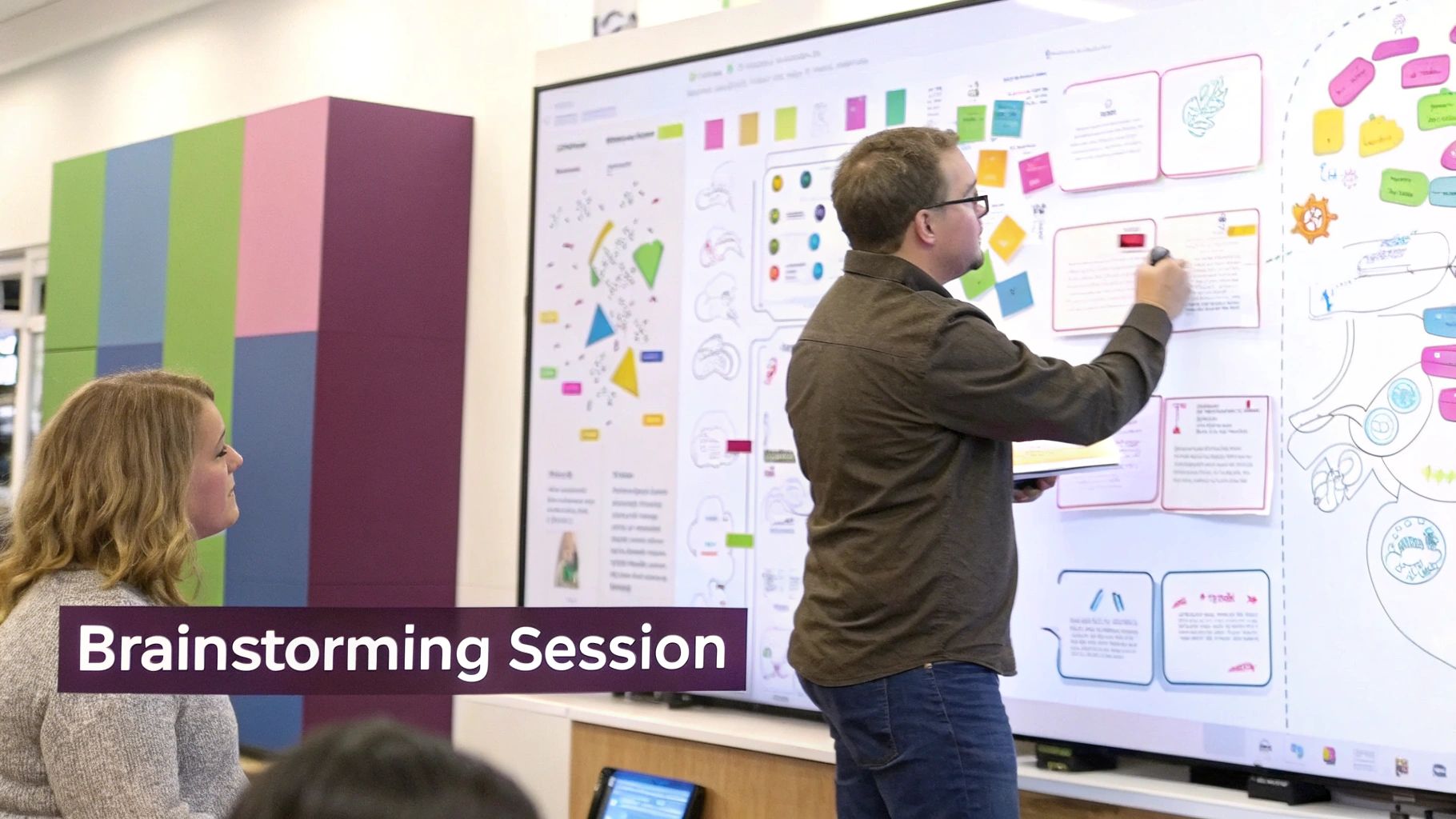Why Virtual Team Building Matters More Than Ever
Remote work has created real challenges in keeping teams connected and working well together. When team members are physically apart, it's easy for communication to break down and for people to feel isolated. Virtual team building has become essential for bringing people together and creating genuine connections across distances.
Companies need fresh approaches to team building that work in an online environment. The days of office parties and in-person retreats are gone for many distributed teams. Virtual activities offer an exciting alternative - they let teams bond and build relationships no matter where people are located. The best part? These online experiences can be designed to tackle specific remote work challenges like building trust and improving how teams communicate. Recent data shows just how important this has become - during the pandemic quarantine period, searches for virtual team building activities skyrocketed by an incredible 2500%. Learn more about the latest team building trends here: teambuilding.com/blog/team-building-statistics
The Impact of Strong Virtual Teams
When done right, virtual team building creates real results. These activities boost employee morale by adding fun and social connection to the workday. They improve communication by getting people talking and collaborating in a relaxed setting. Better communication leads to higher productivity since team members work together more smoothly. Teams also become more innovative because people feel comfortable sharing new ideas.
Avoiding Common Pitfalls
Not all virtual team activities hit the mark. Forcing people to participate in activities they find boring can backfire and create resentment. Scheduling that ignores time zones or cultural differences can leave team members feeling left out. And relying too heavily on technology without adding a personal touch makes activities feel cold and ineffective. The key is picking the right activities and running them thoughtfully. Let's explore what makes virtual team building truly work.
Key Elements of Successful Virtual Team Building
Virtual team building goes far beyond basic video meetings. When done right, it brings teams together and builds authentic connections across digital spaces. Let's explore the essential ingredients that make virtual team building work.
Creating Psychological Safety
Building psychological safety is crucial - team members need to feel they can take risks, share ideas, and be themselves without fear of judgment. While this can be harder in virtual settings, simple activities make a big difference. Regular icebreakers, encouraging open dialogue, and creating a respectful environment help build the trust that teams need to thrive.
Balancing Synchronous and Asynchronous Activities
Finding the right mix of real-time and flexible activities keeps virtual teams engaged. Video calls and online games provide immediate interaction, while shared documents and virtual book clubs let people participate on their own schedule. The key is combining both types thoughtfully to keep teams connected without overwhelming their calendars.
Adapting to Team Dynamics
Every team is unique, so virtual activities need to match your specific group. Team size, cultural backgrounds, and individual personalities all shape what works best. Small teams often connect well through casual virtual coffee chats, while larger groups may prefer structured online games. Research shows teams under 10 members typically collaborate most effectively online, while bigger teams can struggle with reduced individual participation. Strong leadership and the right tech tools are also vital. Learn more: Getting Virtual Teams Right
Building Genuine Trust
At its core, virtual team building is about creating real trust and connection. This means going beyond basic interactions to create moments for authentic engagement. Activities that encourage sharing personal stories, having shared experiences, and building personal bonds help create a truly unified virtual team.
Top 5 Quick-Win Virtual Team Building Activities

Want to level up your remote team's connection and engagement? Let's explore five awesome virtual team building activities that are super easy to implement and pack a real punch when it comes to boosting team spirit and collaboration!
Virtual Coffee Breaks
Get your team together for casual virtual coffee chats that go beyond work talk. It's amazing how a simple coffee break can help people open up and connect! Encourage everyone to bring their favorite beverage and share stories about their weekend adventures or latest Netflix obsessions.
- Benefits: Builds natural connections, creates comfortable social space, helps people relax
- Implementation: Set up regular 15-30 minute video calls, keep topics light and fun, let conversations flow naturally
Online Team Games
Games are perfect for getting people laughing and working together! From quick rounds of "Two Truths and a Lie" to full-on virtual escape rooms, there are tons of options to match your team's style. Want more game ideas? Check out our guide on team building activities ideas.
- Benefits: Gets people excited to participate, builds teamwork skills, adds fun to the workday
- Implementation: Pick games that work for your group size, test the tech setup first, keep rules simple
Virtual Team Lunch
There's something special about sharing a meal together, even virtually! Have everyone grab their lunch and join a casual video hangout. You'll be amazed at how food brings people together and gets conversations flowing.
- Benefits: Creates shared experiences, feels natural and relaxed, gives a true break from work
- Implementation: Pick a consistent time, keep it optional, let people show off their meals
Online Trivia or Bingo
Nothing gets people fired up like a bit of friendly competition! These classic games are super easy to set up and always lead to lots of laughs. The key is keeping them quick and light - perfect for mixing up the workday routine.
- Benefits: Creates buzz and excitement, easy to join in, sparks fun conversations
- Implementation: Use ready-made online platforms, keep rounds short, add small prizes for extra motivation
Virtual Show and Tell
Let team members shine by sharing something they're passionate about! Whether it's showing off their guitar skills, introducing their pets, or talking about their favorite hobby - these personal moments help everyone see new sides of their colleagues.
- Benefits: Helps people feel valued, creates genuine connections, sparks interesting discussions
- Implementation: Keep presentations brief, encourage questions, celebrate each person's unique interests
By mixing these activities into your remote work routine, you'll help create a team that feels more connected and excited to work together. The best part? They're all super simple to start - so why not try one this week?
Creating Meaningful Connections Through Virtual Games
Want to build genuine connections across distributed teams? Virtual team building games offer an exciting way for remote coworkers to bond and collaborate. The magic happens when you understand what makes these activities click. Games focused on teamwork, light competition, and shared wins tend to get the best engagement and participation.
Designing Engaging Virtual Games
The best virtual team activities include smart game design elements that encourage natural interaction. Take virtual escape rooms - they require teams to communicate clearly, combine their skills, and push toward a shared goal. This collaborative problem-solving helps build trust organically. Similar activities like online puzzle hunts or coding challenges create that awesome feeling of achieving something together. For more tips, check out our guide on mastering workplace connections.
Choosing the Right Platform and Managing Skill Levels
Picking the perfect platform makes a huge difference in how smoothly games run. Focus on tools that work well on different devices and have the specific features you need. For example, virtual escape rooms work best with video chat, screen sharing, and breakout rooms for small group work. It's also key to consider varying skill levels - try offering different difficulty options or extra support for newer players to keep everyone included and having fun.
Examples of Engaging Virtual Games
- Virtual Escape Rooms: Work together to solve puzzles and mysteries to "escape" an immersive online scenario
- Online Murder Mysteries: Take on character roles and collaborate to figure out whodunit through investigation and teamwork
- Team-Based Trivia or Bingo: Classic games that translate perfectly online for some friendly competition and knowledge sharing
- Online Board Games or Card Games: Many favorites now have great digital versions perfect for remote play and casual team bonding
By thoughtfully choosing virtual games that match your team's interests, you'll create engaging experiences that bring people together and build real connections. Mix up different types of activities to keep things fresh and make sure there's something everyone enjoys. The key is focusing on fun, shared experiences that help remote teams feel more like a community.
Measuring the Impact of Virtual Team Building

You've started some exciting virtual team activities - but how can you tell if they're making a real difference? Let's look at ways to measure their actual impact beyond just gut feelings. By tracking the right metrics and using data effectively, you can see what's working and keep improving your approach.
Quantifying Success: The Numbers That Matter
Several key metrics can show you how well your virtual team building is working. First, check your participation rates - are people actually joining in? Low turnout could mean the activities aren't connecting with your team. Also valuable are employee satisfaction scores before and after starting virtual team building - these reveal shifts in team morale and engagement. Simple surveys can show if people feel more connected after participating. You can even link these activities to business results like completed projects or sales numbers to demonstrate their practical value.
Gathering Real Team Feedback
While numbers are important, direct feedback from your team adds crucial context. Regular check-ins, post-activity surveys, and open team discussions help you understand what's truly resonating. For example, your team might love virtual coffee chats but find online puzzles too tricky. This kind of honest input helps you adapt activities to match what your team actually enjoys and needs. Keep checking in regularly - your team's preferences may change over time.
Picking the Right Success Measures
Choose metrics that match what you want to achieve with team building. Want better communication? Track how often people collaborate and share ideas. Focused on team spirit? Look at satisfaction scores and activity feedback. The key is deciding your goals first, then finding the best ways to measure progress. With consistent tracking and adjustments based on results, virtual team building becomes a powerful way to build real connections and drive team success.
Advanced Strategies for Long-Term Virtual Team Success

Want to take your virtual team to the next level? Regular team building activities are great, but creating lasting success requires weaving connection and collaboration into the fabric of daily remote work. Let's explore proven strategies that go beyond one-off events to build a thriving virtual culture!
Building Self-Sustaining Virtual Communities
The magic happens when you create spaces for natural connection and collaboration to flourish. Set up dedicated chat channels where team members can share interests and build authentic relationships outside of work discussions. Virtual coffee chats and casual online hangouts give people chances to bond spontaneously, just like they would in an office kitchen. Before you know it, you'll have a close-knit community that sustains itself.
Integrating Team Building Into Daily Workflows
Instead of treating team building as a separate event, weave it naturally into existing routines. Start meetings with fun icebreaker questions that spark conversation. Add collaborative games to training sessions. Create team challenges tied to work projects. When team building becomes part of the normal workflow, it stops feeling forced and starts creating real bonds.
Developing Virtual Team Rituals That Stick
Simple but consistent rituals help teams develop a strong shared identity. Weekly virtual team lunches, monthly book clubs, or collaborative playlists can become cherished traditions that bring people together. The key is choosing inclusive activities that work across time zones and cultures. The best rituals are those that emerge organically from what your specific team enjoys.
Evolving Your Program as Your Team Grows
Your team building approach should grow and change along with your team. Check in regularly to see what's working and gather fresh ideas. Be ready to adapt activities based on changing needs and preferences. Make sure managers have the right skills to engage remote teams through leadership development focused on virtual environments. Staying flexible and responsive keeps engagement high for the long haul.
Looking for a smart way to boost your virtual team's connection and well-being? Neroia offers AI-powered social benefits that make it easy to organize meaningful activities everyone will love. Learn more about how Neroia can transform your workplace culture.




